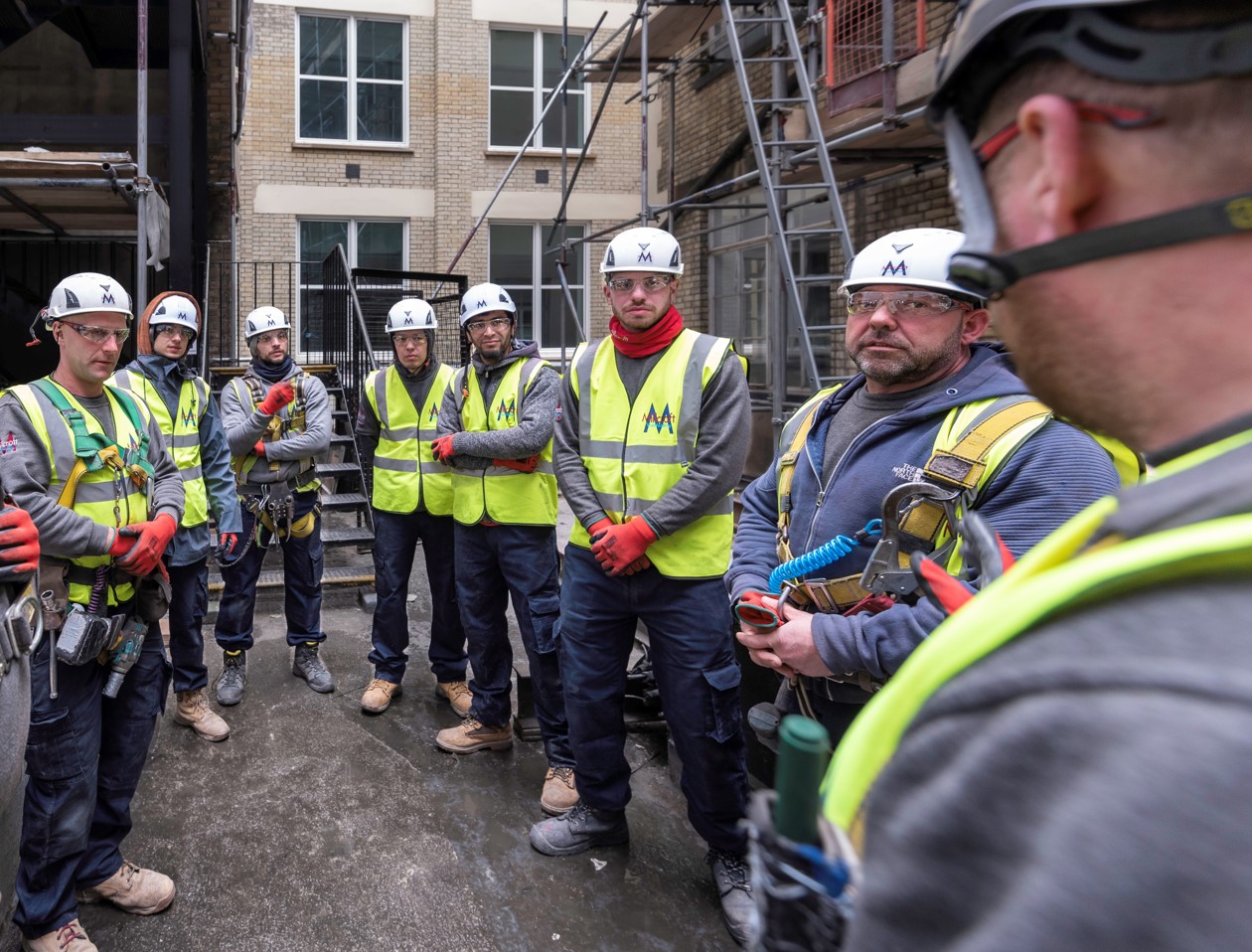When you work in a safety critical industry such as ours, competency is essential. HSE statistics show that last year, out of 40 workers who died due to a fall from height, 24 of them were in construction. This is why training and certification are so important in our industry and central to our business's success. Through continual staff development and rigorous external accreditation, we can ensure that our work is carried out professionally, securely and competently.
Training our workforce for competency at all levels
Scaffolding work is hazardous, and as a company, we take our duty to protect our employees, customers and the general public seriously and do all we can to eliminate or minimise risks. Part of this is achieved through training.
Everyone in the company is provided with the training they require for their roles. This includes FORS eLearning for our drivers to maintain their compulsory 35 hours Certificate of Confidence (CPC). Our CITB Site Safety Plus training centre is approved to deliver (SMSTS) Site Management Safety Training Scheme courses and Site Supervision Safety Training Scheme (SSSTS) courses. Here, we also deliver the CISRS Operatives Training Scheme (COTS) course as our centre and in-house trainer is approved by the Construction Industry Scaffolders Record Scheme (CISRS).
Industry recognised training schemes for on-site competency
All our operatives complete the Construction Industry Scaffolders Record Scheme (CISRS) training relevant to their role. For example, our yard operatives and labourers hold a green CISRS COTS card which allows them to work from a safe place, such as on the ground or a fully completed scaffold platform. They are not yet competent to erect, alter or dismantle scaffolding.
With our full support, individuals can work their way up the career ladder and gain the skills and training required to earn the relevant CISRS card. Everyone must take a recognised health, safety and environment test as standard and then, depending on which card they are applying for, they will need to undertake additional training and testing.
This includes training on core scaffolding skills, such as safely erecting and dismantling basic scaffolding structures for the blue CISRS Scaffolder (Tube & Fitting) card. Those wanting to carry out scaffold inspections on basic structures attend a 3-day course to attain their Basic Scaffold Inspection card. At the top level of experience and skills, you have the Advanced Scaffold Inspection and the gold cards for Advanced Scaffolder and Manager & Supervisor, which cover industry regulations and health and safety legislation, toolbox talk delivery, risk assessments, and method statements (RAMS).
“Before we take someone on at the start of their career, we want to see evidence that they understand the demands of the industry and the type of work they will be carrying out,” explains Richard Ramkissoon, Millcroft’s Health & Safety Advisor. “Once they join us and show the right initiative and desire to progress, we support them with their training needs. By nurturing our people in this way, we’re giving them the skills to progress in their career while at the same time maintaining a motivated and competent workforce.”
Specialist training for challenging projects
Most of our scaffolding projects involve working at height, but every now and then we’re faced with particularly challenging environments which require specialist skills and training.
Millcroft has recently provided scaffolding to support the construction of the Colne Valley Viaduct for HS2. This required our teams to work out of boats to erect the scaffolding, wearing life jackets instead of their regular harnesses. Before deployment, our specialist HS2 team completed a Safe Working in Water (SWIW) course, which trains operatives in self and co-worker rescue. The 2-day course included instruction on safe systems of work, cold water considerations, swimming and self-rescue in lifejackets and other rescue techniques, including reach poles. Thankfully, so far, our teams have not had to put their training into practice.
In addition to working on water, there are also occasions when we need to work below ground. Our confined space training has enabled us to deliver specialist projects for Thames Water and Transport for London (TfL) - a client of ours for more than 40 years. This training has given us expert knowledge and understanding of the potential hazards to construct scaffolding safely and competently in restricted spaces. For HS2, we have worked to 30m depth in a tunnel, while for Thames Water, we have carried out several projects across its portfolio and provide 24/7 responsive maintenance work to enable utility contractors to work safely at all times.
Your assurance of our competency
Our competency is not measured solely by our training and which CISRS cards our operatives hold; we also undergo stringent external assessments by leading schemes and industry bodies. These include ISO standards for quality, environmental and occupational health and safety management, and sector-specific certifications such as Achilles UVDB for the utilities industry.
In addition to these accreditations, Millcroft has achieved a total of 10 consecutive Gold RoSPA awards, which has resulted in us being presented with the President’s Award - a testament to our consistent health and safety performance and competency across all areas of our business.
These third-party accreditations and certifications demonstrate our commitment to maintaining high levels of health and safety, quality, and environmental management and are your assurance of our continued professionalism.
Maintaining a culture of safety and professionalism
Comprehensive training and certification are not mere formalities for us; they are the cornerstones of our business: of the safety and the quality of our workmanship which helps drive our success. Our training and certifications guarantee that our work is carried out with precision and professionalism, and to the highest of standards, every time. From standard industry courses to specialised training, our operatives gain the expertise to navigate the challenges of working at height and contribute to a secure work environment both off and on-site.

